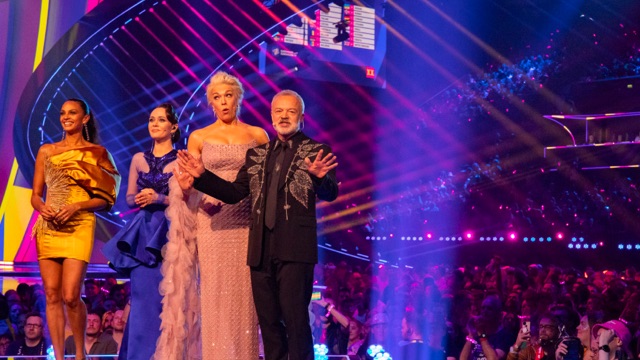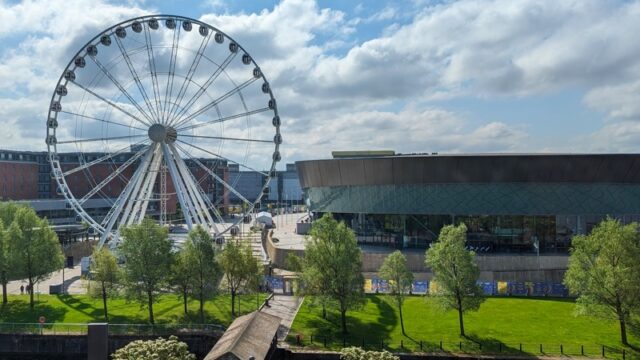There’s something quite beautiful about the fact that, after a quarter of a century waiting to host the Eurovision Song Contest (or “the damn thing” as Terry Wogan labelled it back in 1998), the United Kingdom’s turn to welcome the rest of Europe – and beyond – to its shores came on behalf of supporting a close ally rather than as a result of a UK victory.
The fact that the Song Contest in 2023 was, from the outset, anything but a typical affair arguably played into the BBC’s hands from the get go; the broadcaster was able to dispense with any calls for Liverpool’s first bite of the Contest’s cherry to be the kind of boastful ‘Festival of Britain’ right-wing politicians would have lusted over. Rather, it enabled the BBC to play around with a blank canvas. Yes, there were numerous nods to both Ukraine and the war it currently finds itself fighting, and the BBC’s penchant for pulling off live coverage of huge events (the Song Contest itself happening just days after the Coronation of King Charles III) certainly left its mark. Yet the feel of both Semi Finals and the Grand Final itself were one of the United Kingdom playing host to the rest of Europe, rather than being the host – a small, but nevertheless crucial, difference.
This is the mood the EBU has been shooting for since the Contest’s rebrand back in 2004. The concept of the Eurovision Song Contest being united under one consistent logo, year after year, was all about stepping back from the unintentional but unavoidable tinge of nationalism that had come to play with hosts in the late 1980s and early 1990s.
It’s an effort Eurovision aficionados cannot fail to have noticed over the last decade or so. Gone are the days of the postcards exclusively showcasing the host country’s most beautiful tourist traps every three minutes – Ireland having cast light on every single inch of its dramatic coastline and beautiful countryside during its run as the undisputed king of Europe almost three decades ago. The very concept of the Contest being presented almost entirely in the host country’s language a la Rome 1991 would seem entirely alien in 2023.
Instead, the EBU has steered modern Eurovision towards highlighting what the host country has in common with its European and Australian kin, rather than flaunting what makes it different, or – in perception at least – superior.
When Eurovision Was Selfish
The fruits of this long-term labour arguably first came to bear during Tel Aviv’s turn to host in 2019 when, as part of the interval act, the IPBC laid on Switch Song: a sweet little 10-minute set piece where previous competitors – crucially including Cyprus’s Eleni Foureira, who only narrowly lost out to Israel’s Netta in 2018 – performed their own unique takes on each others’ songs. Indeed, it’s not hard to see why the BBC decided to mirror this in spirit with its own Liverpool Songbook.
In stark contrast, it’s as hard to imagine Ireland’s RTE inviting Michael Ball or Sonia to return to perform a previous winner’s entry as it is either of them accepting such an offer. It might not have had all the bells and whistles of the modern Song Contest, but Eurovision was ironically a less friendly, more spikey affair, even if the commercial and critical kudos that went with taking part or even winning were often lacking.
As such, host countries would do their darn best to use every minute the competition afforded them to push their cultural assets, which made the 15 minutes of ‘dead air’ when juries were coordinating and finalising their votes a potential prime time. Whether it was Riverdance or Boyzone, the interval evolved into an unashamed advert for both the host nation and the broadcaster itself, with the technicality of pulling off a memorable spectacle as important as the act itself.
Sometimes the desire to bombard the audience with a cultural commercial extended beyond the aforementioned postcards or interval act, Sweden’s SVT arguably taking the cake in 1992 by plonking a huge great viking ship in the middle of the Malmo stage – a move that ensured that particular slice of Nordic history dominated every single performance throughout the night, relevant or not.
Bringing Europe Together
The modern Eurovision Song Contest, however, is now a much more intentionally generic affair, however. Scroll through clips of performances from the last decade, and you’d be hard-pushed to tell many of the stages apart, the standard blacked-out arena lit up only by vast LED screens and pyrotechnics having become the norm. In 2023, Eurovision is less about repeatedly bashing the viewer of the head with the host country’s clout and more about the host broadcaster subtly or not so subtly showing the EBU just what it’s capable of.
On this note, I’m sadly without any inside line to the important people within the EBU but it’s hard to imagine Eurovision 2023 gave them all too much to complain about. I visited Liverpool on the weekend before the Contest started and, even as a resolute adopted Mancunian, I had to admit I could already see our near neighbours were going to do one hell of a job. The whole city was alive, with the free fan zones already full a whole seven days before the Grand Final was due to kick off. For a country that many have lazily assumed was ambivalent about Eurovision, Liverpool did one hell of a job of suggesting that, no, the Brits are quite fond of the ol’ competition, thanks.
Like London’s glorious Olympics little over ten years previously, even a casual observer of the two Semi Finals and the Grand Final would have to admit that the BBC and Liverpool as a whole had thrown everything at the Contest, aided as I say by the fact it wasn’t hosting upon the back of a stupendous victory, but rather hosting on behalf of a friend in need. This enabled the BBC to lean into celebrating British qualities that have been largely invisible since Brexit reared its particularly ugly head; of celebrating diversity, of welcoming new friends, of rooting for the underdog, and most importantly, of not taking itself too seriously.
Indeed, by mixing the admirably-calm-under-pressure Alesha Dixon and instantly legendary Hannah Waddingham with Ukraine’s rock goddess Julia Sanina, the BBC was smartly able to cast a light on the peculiar excentricities of the UK from the perspective of an outsider, perhaps best illustrated when Peppa Pig randomly starting a conga line in one of the Semi Finals, much to the amusing bemusement of Sanina herself.
The whole set-up, of the UK and Ukraine being “United by music”, gave the BBC a sense of freedom it may not have afforded itself under normal circumstances – especially given the broadcaster finds itself in the most perilous predicament in its history, attacked from all sides as it attempts to find its place in a world seemingly angry at its mere existence. Indeed, it’s fair to say the BBC has not covered itself in glory during the last decade or so and it has brought much of the pain its currently suffering upon itself. But, boy, as Conchita might say, what a phoenix from the flames moment Liverpool 2023 really was for the public service broadcaster.
A Comforting Contest
Like Sweden’s SVT and its two bites of the cherry in Malmö 2013 and Stockholm 2016 respectively, Liverpool 2023 stands as an example of a Eurovision Song Contest truly comfortable in its own skin; a Song Contest able to treat the competition to the gravitas it deserves whilst still being able to poke fun at itself.
The undoubted highlight for me was the “Be Who You Wanna Be” Medley featuring drag queens Miss Demeanour, Tamara Thomas and Will Peaco (along with the rightful rehabilitation of the under-appreciated ‘We Got Love’ by Jessica Mauboy from Lisbon 2018) which not only celebrated Eurovision’s now long found drive for diversity, but also intentionally or unintentionally did away with some previous hosts’ reluctance to acknowledge the Contest’s loyal LGBTQ+ audience.
Yes, Moscow 2009, we’re looking squarely at you.
As was the case with Birmingham in 1998, the BBC made sure the Eurovision Song Contest was a piece of unashamed entertainment design to delight during Europe’s darkest of days. It was, in short, the BBC at its best; confident yet brilliantly self-deprecating, warm without being overly weepy, and positively slick without coming across as unduly corporate. Let’s hope the wait for its next crack at the Eurovision whip is decidedly shorter than the last.











